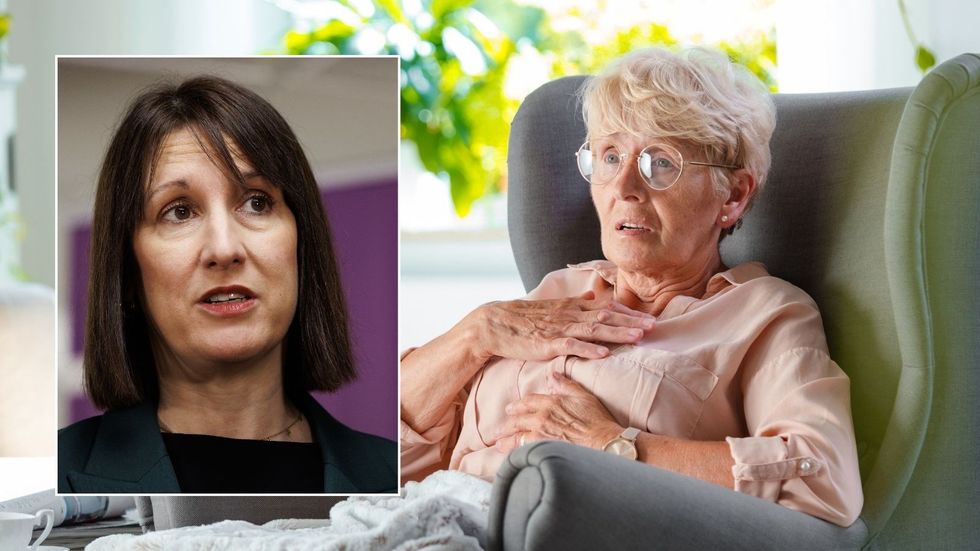World War 2 veteran Anne Puckridge shares her ‘heartbreak’ over frozen pensions
GB NEWS
The state pension is currently planned to rise from 66 to 67 sometime between 2026 and 2028
Don't Miss
Most Read
Trending on GB News
Chancellor Rachel Reeves is set to cash in an additional £6billion annually for the Treasury by implementing planned increases to the state pension age, according to a new report published today.
The findings, released by the Institute for Fiscal Studies (IFS) and pension provider abrdn, reveal the substantial financial impact of raising the state pension age from 66 to 67 between 2026 and 2028.
This hike has been introduced by successive Governments and is based on projected rises in life expectancy.
However, this latest report highlights concerns about poverty rates among certain groups of pensioners, prompting calls for targeted support measures.
The IFS study suggests the Labour Government would need to allocate nearly £800million a year to counteract the worst effects of state pension poverty.
The IFS report found that while poverty rates among over-65s are generally lower than working-age populations, certain groups face higher risks of financial hardship.
Private renters are particularly vulnerable, with this demographic showing a concerning upward trend.
Only four per cent of those born in the 1940s were private renters in their mid-50s, compared to 10 per cent of those born in the 1960s.
Do you have a money story you’d like to share? Get in touch by emailing money@gbnews.uk.

The Chancellor is set to cash in billions from planned hikes to the state pension
GETTY / PA
According to the think tank's researchers, there is specific concern about the growing number of pensioners who rent rather than own their homes.
This trend is expected to continue, potentially leading to increased poverty rates among future retirees.
The report suggests that targeted state support could help mitigate these challenges for vulnerable groups approaching retirement age.
As part of its findings, the IFS outlines two potential support measures to help those affected by pension age increases.
Its first proposal would provide additional support to those one year below state pension age who receive universal credit.
This measure would cost approximately £600m annually, representing one-tenth of the savings generated by raising the pension age.
It could help reduce poverty in around 30,000 households.
A second, more targeted approach would focus on those receiving both universal credit and health-related benefits.
This alternative would cost roughly £200m per year but would only assist approximately 3,000 households in escaping poverty.
The IFS noted that while broader support for low-income individuals could further reduce poverty levels, such measures would carry higher costs and potentially impact employment rates negatively.
The IFS has proposed allowing pensioners to claim housing benefit for an additional room as another support measure.
This would enable single pensioners and couples to receive support based on two-bedroom homes in their local area, costing around £150m annually.
If implemented, this policy idea would accommodate visits from children and grandchildren, recognising that older people in the UK often spend significant time at home alone.
Heidi Karjalainen, a senior research economist at IFS and an author of the report, broke down why Reeves and future Chancellors need to address issues surrounding retirement as soon as possible.
She explained: "Increasing the state pension age is a key policy to help the long-run sustainability of the public finances in the face of people living longer at older ages.
"But it does hit those on low incomes who are already not in paid work before the current state pension age particularly hard.
"Failing to support the most harmed groups risks undermining public confidence in the system and, in particular, the desirability of increases in the state pension age.
LATEST DEVELOPMENTS:

Britons are concerned over how a potential increase to the state pension will affect their retirement savings in the years to come
GETTY"There is a good case for using some of the savings resulting from a higher state pension age for targeted enhancements to working-age benefits for the most adversely affected groups in the run-up to state pension age."
Mubin Haq, CEO of abrdn Financial Fairness Trust, added: "Levels of poverty amongst private renter pensioners are three times the rate amongst owner-occupiers, with the number living in the private rented sector set to rise significantly.
"Hardship is also high amongst social renters; however, the situation for private renter pensioners is particularly worrying.
"Not only are rents higher, and there is less security of tenure, but state support with housing costs for those on low incomes often fails to meet actual costs or needs and it doesn’t tackle the low availability of one-bedroom properties.
"Increasing housing benefit to allow for a second bedroom would better meet the real cost of private renting and provide much-needed space for carers and family to support older people with their increasing health needs."








